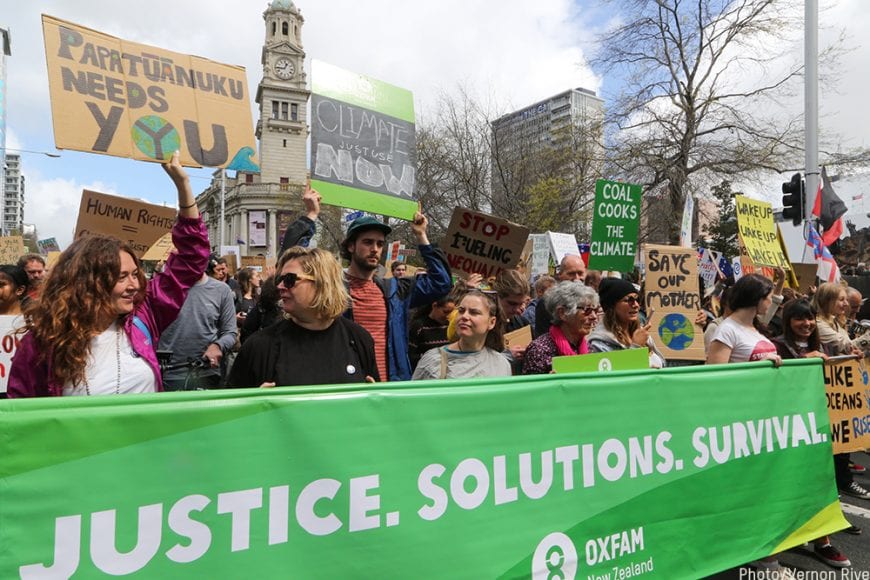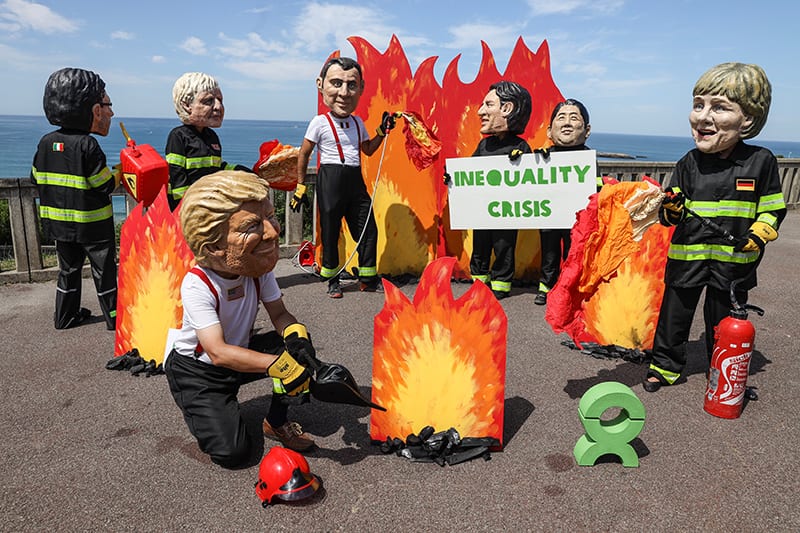What a year 2019 has been. Together, we’ve achieved so much. The global systems of injustice and the extremely rich and powerful people who are enabling them are not easy to tackle. But by using our power as citizens, we are building the foundations of a just, inclusive and sustainable world for all, and are shifting the window of what is politically possible. Here’s an overview of the change you have helped make happen this year.

Taking collective action for climate justice
Momentum for tackling climate breakdown skyrocketed up the political agenda this year, and we’ve been excited to support movements like the School Strikers, Pacific Climate Warriors and Generation Zero as they’ve walked the streets and the halls of parliament to fight for the climate action we need from our government. We are so pleased New Zealand now has a Zero Carbon Act to provide a starting line for getting our pollution down.
We also worked hard to ensure that our government is starting to lift its support for people who are on the frontlines of climate destruction, including our colleagues, friends and family in the Pacific and beyond, through securing a US$10 million boost to the Green Climate Fund.
With you, the Oxfam community:
- Sent powerful submissions on the Zero Carbon Act, and delivered an 11,000 strong petition to Parliament calling on MPs to #BackTheAct along with Generation Zero, WWF and World Vision.
- Sent over 250 letters to Minister Peters asking for a boost in resourcing for our neighbours to fight climate breakdown.
- Sent over 300 letters to Minister Shaw demanding New Zealand stand with the Pacific at the COP25, the UN climate talks.
Keeping inequality on the political agenda and pushing for multinationals to pay their fair share
We’ve been working hard to get our government to make sure international tax rules are fair for all countries. We mobilised around the government’s Tax Working Group and in international negotiations, to stop multinational corporations shirking their fair share of taxes that help the world’s governments provide for their people. Together, we’ve:
- Delivered the demands of nearly 8000 people to tell parliament that we want tax transparency by opening the books of multinational corporations.
- Sent over 400 submissions to IRD on international tax rules for a digital economy.
What these achievements do is keep international tax rules on the government’s agenda, and they make sure that people in government have to think about tax issues. This is the first step in changing policy – getting the ideas and information across the desks of the right people, and providing a mandate for change.
We’ve supported the creation of Tax Justice Aotearoa, a new organisation that works to make sure our government has the tax it needs to fund our hospitals and schools, and that everyone is contributing their fair share. Tax Justice Aotearoa ran a campaign in support of a capital gains tax, hosted Tax on Tuesdays, a series of talks about tax, wrote submissions and several policy briefs, and met with MPs and Ministers.
Making our aid work for those who need it most
We’ve been working to get international development policy that focuses on the people who need our help the most, by building connections across the Ministry of Foreign Affairs and Trade. The government recently released its new policy, and we were pleased to see a strong focus on human rights and inclusion. We also presented to Parliament’s Inquiry into New Zealand’s Aid – you can watch our Advocacy and Campaigns Director, Jo, give Oxfam’s submission to Select Committee here (from 1h 50min).
For World Humanitarian Day, we joined with other NGOs to remind the government that New Zealand must continue to support and protect victims of the Syrian conflict through the #NZisWatching campaign.
There’s lots to do, but together we are powerful
Tackling systems of injustice – both in New Zealand and across the world – can be slow and frustrating. Sometimes simply raising a voice, shedding light on an issue, or just holding the line so things don’t go backwards, is a huge achievement. We do this work alongside and on behalf of people who are focused on getting food on the table for their children and keeping a roof over their heads. They can’t do this work alone.
The only way we can stop injustice is through our collective action – working together, harmonising our voices and holding the powerful to account. We get inspiration and motivation from the things you do to make the world a better place.
We look forward to more of this in 2020. It will be a big year – we have to inspire governments and corporations to do much more to stop climate destruction. We have a unique opportunity to change the international tax rules for the better. And we can make sure the money we give for overseas development assistance is spent on stopping poverty and injustice. All in the midst of an election!
So, it’s a good time for some rest, reflection and connecting with loved ones over the festive season, and then getting back into making change with you in the new year.
Ngā Manaakitanga,
Jo and Alex
Your Advocacy and Campaigns Team at Oxfam New Zealand






